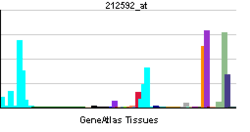J chain
| View/Edit Human | View/Edit Mouse |

1: Base unit.
2: Heavy chains.
3: Light chains.
4: J chain.
5: Intermolecular disulfide bonds.

A J chain is a protein component of the antibodies IgM and IgA.[3] It is a 137 residue polypeptide,[4] encoded by the IGJ gene.[5][6][7]
Structure
The J Chain's molecular weight is approximately 15 kDa. It exhibits a standard immunoglobulin folding structure of two β-pleated sheets of four ribbons folded against one another. It has 8 cystine residues. Two of these residues link the α chains of IgA or the μ chains of IgM via disulfide bridges, effectively serving as the "glue" between two Fc regions of the antibody.[8]
The J-chain shows a large degree of homology between avian and human species, suggesting that it serves an important function.[8]
Function
The J Chain is required for IgM or IgA to be secreted into mucosa.[4]
Because IgM and IgA are the only two types of antibody that polymerize, initial hypotheses stated that J chain was required for polymerization. However, it was subsequently found that IgM is able to polymerize in the absence of J chain as both a pentamer and a hexamer, however, both of these exist to lesser numbers in organisms lacking J chains. In such cases, there are also fewer IgA dimers.[4]
References
- ↑ "Human PubMed Reference:".
- ↑ "Mouse PubMed Reference:".
- ↑ Levinson. Medical Microbiology and Immunology (11 ed.). McGrawHill. pp. 405–6.
- 1 2 3 Schroeder, Harry; Wald, David; Greenspan, Neil (2008). "Chapter 4: Immunoglobulins: Structure and Function". In Paul, William. Fundamental Immunology (Book) (6th ed.). Philadelphia, PA: Lippincott Williams & Wilkins. pp. 125–151. ISBN 0-7817-6519-6.
- ↑ Max EE, McBride OW, Morton CC, Robinson MA (Sep 1986). "Human J chain gene: chromosomal localization and associated restriction fragment length polymorphisms". Proc Natl Acad Sci U S A. 83 (15): 5592–6. doi:10.1073/pnas.83.15.5592. PMC 386334
 . PMID 3016707.
. PMID 3016707. - ↑ Max EE, Korsmeyer SJ (May 1985). "Human J chain gene. Structure and expression in B lymphoid cells". J Exp Med. 161 (4): 832–49. doi:10.1084/jem.161.4.832. PMC 2189063
 . PMID 2984306.
. PMID 2984306. - ↑ "Entrez Gene: IGJ immunoglobulin J polypeptide, linker protein for immunoglobulin alpha and mu polypeptides".
- 1 2 Kiyono, Hiroshi; Kunisawa, Jaw; McGhee, Jerry; Mestecky, Jiri (2008). "Chapter 31: The Mucosal Immune System". In Paul, William. Fundamental Immunology (Book) (6th ed.). Philadelphia, PA: Lippincott Williams & Wilkins. pp. 983–1030. ISBN 0-7817-6519-6.
Further reading
- Koshland ME (1986). "The coming of age of the immunoglobulin J chain.". Annu. Rev. Immunol. 3: 425–53. doi:10.1146/annurev.iy.03.040185.002233. PMID 2415140.
- Tartakoff A, Vassalli P (1980). "Plasma cell immunoglobulin M molecules. Their biosynthesis, assembly, and intracellular transport.". J. Cell Biol. 83 (2 Pt 1): 284–99. doi:10.1083/jcb.83.2.284. PMC 2111544
 . PMID 115892.
. PMID 115892. - Mole JE, Bhown AS, Bennett JC (1977). "Primary structure of human J chain: alignment of peptides from chemical and enzymatic hydrolyses.". Biochemistry. 16 (16): 3507–13. doi:10.1021/bi00635a002. PMID 407930.
- Bastian A, Kratzin H, Eckart K, Hilschmann N (1993). "Intra- and interchain disulfide bridges of the human J chain in secretory immunoglobulin A.". Biol. Chem. Hoppe-Seyler. 373 (12): 1255–63. doi:10.1515/bchm3.1992.373.2.1255. PMID 1292512.
- Frutiger S, Hughes GJ, Paquet N, et al. (1993). "Disulfide bond assignment in human J chain and its covalent pairing with immunoglobulin M.". Biochemistry. 31 (50): 12643–7. doi:10.1021/bi00165a014. PMID 1472500.
- Moro I, Iwase T, Komiyama K, et al. (1990). "Immunoglobulin A (IgA) polymerization sites in human immunocytes: immunoelectron microscopic study.". Cell Struct. Funct. 15 (2): 85–91. doi:10.1247/csf.15.85. PMID 2113434.
- Alberini CM, Bet P, Milstein C, Sitia R (1990). "Secretion of immunoglobulin M assembly intermediates in the presence of reducing agents.". Nature. 347 (6292): 485–7. doi:10.1038/347485a0. PMID 2120591.
- Sumi Y, Nagura H, Kaneda T, Oka T (1989). "Immunoelectron microscopical localization of immunoglobulins, secretory component and J chain in the human minor salivary glands.". J. Oral Pathol. 17 (8): 390–5. doi:10.1111/j.1600-0714.1988.tb01303.x. PMID 3146624.
- Hajdu I, Moldoveanu Z, Cooper MD, Mestecky J (1984). "Ultrastructural studies of human lymphoid cells. mu and J chain expression as a function of B cell differentiation.". J. Exp. Med. 158 (6): 1993–2006. doi:10.1084/jem.158.6.1993. PMC 2187181
 . PMID 6417260.
. PMID 6417260. - Yasuda N, Kanoh T, Uchino H (1980). "J chain synthesis in human myeloma cells: light and electron microscopic studies.". Clin. Exp. Immunol. 40 (3): 573–80. PMC 1538946
 . PMID 6774844.
. PMID 6774844. - Harper SJ, Allen AC, Béné MC, et al. (1995). "Increased dimeric IgA-producing B cells in tonsils in IgA nephropathy determined by in situ hybridization for J chain mRNA.". Clin. Exp. Immunol. 101 (3): 442–8. doi:10.1111/j.1365-2249.1995.tb03132.x. PMC 1553245
 . PMID 7664491.
. PMID 7664491. - Iwase T, Saito I, Takahashi T, et al. (1994). "Early expression of human J chain and mu chain gene in the fetal liver.". Cell Struct. Funct. 18 (5): 297–302. doi:10.1247/csf.18.297. PMID 8168154.
- Harper SJ, Pringle JH, Wicks AC, et al. (1994). "Expression of J chain mRNA in duodenal IgA plasma cells in IgA nephropathy.". Kidney Int. 45 (3): 836–44. doi:10.1038/ki.1994.110. PMID 8196286.
- Bjercke S, Brandtzaeg P (1994). "Glandular distribution of immunoglobulins, J chain, secretory component, and HLA-DR in the human endometrium throughout the menstrual cycle.". Hum. Reprod. 8 (9): 1420–5. PMID 8253928.
- Bertrand FE, Billips LG, Gartland GL, et al. (1996). "The J chain gene is transcribed during B and T lymphopoiesis in humans.". J. Immunol. 156 (11): 4240–4. PMID 8666793.
- Atkin JD, Pleass RJ, Owens RJ, Woof JM (1996). "Mutagenesis of the human IgA1 heavy chain tailpiece that prevents dimer assembly.". J. Immunol. 157 (1): 156–9. PMID 8683109.
- Strausberg RL, Feingold EA, Grouse LH, et al. (2003). "Generation and initial analysis of more than 15,000 full-length human and mouse cDNA sequences.". Proc. Natl. Acad. Sci. U.S.A. 99 (26): 16899–903. doi:10.1073/pnas.242603899. PMC 139241
 . PMID 12477932.
. PMID 12477932.
